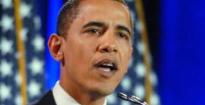Rolling Stone Interviews Obama
 Rolling Stone reports:
Rolling Stone reports:
The following is an article from the October 15, 2010 issue of Rolling Stone.
We arrived at the southwest gate of the white house a little after one o'clock on the afternoon of September 17th. It was a warm fall day, but the capital felt quiet and half-empty, as it does on Fridays at the end of summer, with Congress still in recess. Rolling Stone had interviewed Barack Obama twice before, both times aboard his campaign plane — first in June 2008, a few days after he won the Democratic nomination, and again that October, a month before his election. This time executive editor Eric Bates and I sat down with the president in the Oval Office, flanked by busts of Abraham Lincoln and Martin Luther King Jr. The conversation stretched on for nearly an hour and a quarter. The president began by complimenting my multi-colored striped socks. "If I wasn't president," he laughed, "I could wear socks like that."
When you came into office, you felt you would be able to work with the other side. When did you realize that the Republicans had abandoned any real effort to work with you and create bipartisan policy?
Well, I'll tell you that given the state of the economy during my transition, between my election and being sworn in, our working assumption was that everybody was going to want to pull together, because there was a sizable chance that we could have a financial meltdown and the entire country could plunge into a depression. So we had to work very rapidly to try to create a combination of measures that would stop the free-fall and cauterize the job loss.The recovery package we shaped was put together on the theory that we shouldn't exclude any ideas on the basis of ideological predispositions, and so a third of the Recovery Act were tax cuts. Now, they happened to be the most progressive tax cuts in history, very much geared toward middle-class families. There was not only a fairness rationale to that, but also an economic rationale — those were the folks who were most likely to spend the money and, hence, prop up demand at a time when the economy was really freezing up.
I still remember going over to the Republican caucus to meet with them and present our ideas, and to solicit ideas from them before we presented the final package. And on the way over, the caucus essentially released a statement that said, "We're going to all vote 'No' as a caucus." And this was before we'd even had the conversation. At that point, we realized that we weren't going to get the kind of cooperation we'd anticipated. The strategy the Republicans were going to pursue was one of sitting on the sidelines, trying to gum up the works, based on the assumption that given the scope and size of the recovery, the economy probably wouldn't be very good, even in 2010, and that they were better off being able to assign the blame to us than work with us to try to solve the problem.
How do you feel about the fact that day after day, there's this really destructive attack on whatever you propose? Does that bother you? Has it shocked you?
I don't think it's a shock. I had served in the United States Senate; I had seen how the filibuster had become a routine tool to slow things down, as opposed to what it used to be, which was a selective tool — although often a very destructive one, because it was typically targeted at civil rights and the aspirations of African-Americans who were trying to be freed up from Jim Crow. But I'd been in the Senate long enough to know that the machinery there was breaking down.What I was surprised somewhat by, and disappointed by, although I've got to give some grudging admiration for just how effective it's been, was the degree to which [Senate Minority Leader] Mitch McConnell was able to keep his caucus together on a lot of issues. Eventually, we were able to wear them down, so that we were able to finally get really important laws passed, some of which haven't gotten a lot of attention — the credit-card reform bill, or the anti-tobacco legislation, or preventing housing and mortgage fraud. We'd be able to pick off two or three Republicans who wanted to do the right thing.
But the delays, the cloture votes, the unprecedented obstruction that has taken place in the Senate took its toll. Even if you eventually got something done, it would take so long and it would be so contentious, that it sent a message to the public that "Gosh, Obama said he was going to come in and change Washington, and it's exactly the same, it's more contentious than ever." Everything just seems to drag on — even what should be routine activities, like appointments, aren't happening. So it created an atmosphere in which a public that is already very skeptical of government, but was maybe feeling hopeful right after my election, felt deflated and sort of felt, "We're just seeing more of the same."
Click here to read more.

